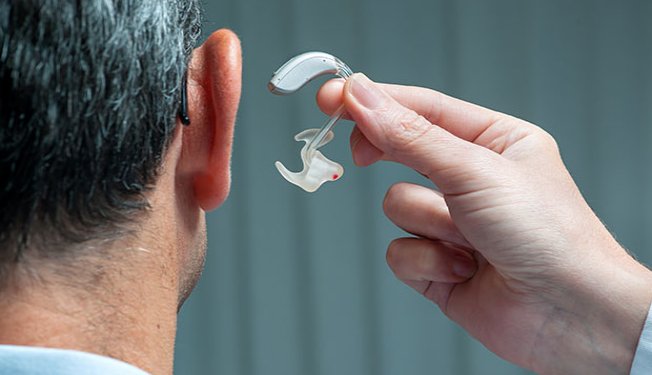By University of Maryland Department of Hearing and Speech Sciences
Photo Credit: Shutterstock
Although about 28.8 million Americans could benefit from wearing hearing aids, less than a third of that population actually uses them, according to the National Institutes of Health. While cost is a contributing factor, experts say many people with hearing loss choose not to wear hearing aids simply because they have difficulty adjusting to them. Researchers with the University of Maryland Department of Hearing and Speech Sciences (HESP) are hoping to improve those figures by developing better procedures for fitting people with hearing aids for the first time.
“Right now when someone is fitted with hearing aids, the focus is on increasing audibility of sounds reaching the ear,” says HESP Assistant Professor Samira Anderson, Au.D., Ph.D. “However, in order to actually understand what someone is saying, sound has to travel from the ear up to the brain. We’re interested in understanding how wearing a hearing aid affects that process.”
Dr. Anderson, University of Maryland Department of Hearing and Speech Sciences
In a study published recently in Ear & Hearing, Anderson and colleagues outfitted 37 older adults with mild to severe hearing loss with new, in-the-ear hearing aids donated by Widex USA. The researchers placed electrodes on the surface of the patients’ skin to measure electrical activity produced in response to sound in the auditory cortex and midbrain. They found that the brain’s processing of sounds improved while wearing hearing aids.
“There’s a growing body of research showing that hearing loss can lead to accelerated cognitive decline and isolation as people age,” Anderson says. “My hope is that we can develop enhanced testing procedures that will allow more people to benefit from hearing aids and enjoy a better quality of life.”
The UMD research team plans to continue evaluating the patients in their study during the first six months of hearing aid use. In future studies, researchers hope to investigate the effects of manipulating hearing aid parameters on neural processing. The study was funded by the UMD Department of Hearing and Speech Sciences, Hearing Health Foundation, and the National Institutes of Health (NIDCD Grant T32DC000046).
Samira Anderson, Au.D., Ph.D., is a 2014 Emerging Research Grants researcher generously funded by the General Grand Chapter Royal Arch Masons International. We thank the Royal Arch Masons for their ongoing support of research in the area of central auditory processing disorder. Read more about Anderson and her research in “A Closer Look,” in the Winter 2014 issue of Hearing Health.
We need your help supporting innovative hearing and balance science through our Emerging Research Grants program. Please make a contribution today.





